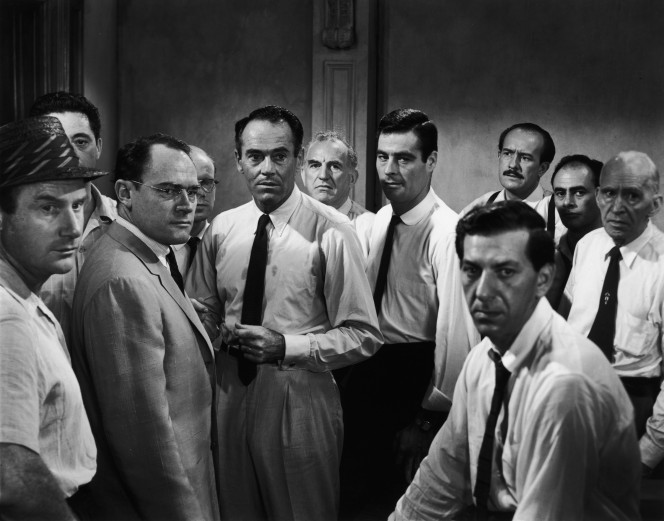
Dir.: Sidney Lumet; Cast: Henry Fonda, Lee J. Cobb, Ed Begley, Jack Klugman, Martin Balsam, E.G. Marshall; USA 1957, 96 min.
Filmed for a mere $ 350 000 and shot in 19 days, Sidney Lumet’s first feature film was destined to become a classic, even though it was a commercial flop. Lumet had directed Reginald Rose’ play of the same name already for Television, and the theatrical nature of the set up – a single room where the Jury deliberates the case of a Puerto Rican teenager, who stabbed his abusive father to death – run against the current wave of widescreen, TechniColour movies that were in vogue at the time.
Even though the advertisement headline was as lurid as possible: “Life in their hands – Death on their minds. It explodes like 12 sticks of dynamite!” Surely, this sort of sensationalism was attracting the wrong target group: TWELVE ANGRY MEN, shot in black and white by DoP Boris Kaufman (Baby Doll) – is a didactic exercise on the thesis “Prejudice always obscures the truth”. The twelve jurors have the life of the teenager in their hands, but their reasons for their verdict turn out mostly to be personal. Eleven of them are clear at the beginning, that the accused is guilty – they want to get it over with as quick as possible, to return to their ordinary lives. Only Henry Fonda (this being his only producer’s credit) as Juror 8, has doubts. After he is joined by another juror – who wants to give him a chance to elaborate his doubts – Fonda is able to get more and more of the all white, middle aged men jury on his side. Some are simply insecure (Juror 8), or not up to the task, like Juror 1, the foreman (Balsam). Then there is the arrogant stockbroker (Juror 4), E.G. Marshall, who believes in “methodical” thinking, and sees himself far superior to all others. Juror 10, is a great performance by Ed Begley, who plays the out-ant-out racist brilliantly. Finally, Lee J Cobb (Juror 3), who hates his son, after being left by him: he holds out the longest, having a clear personal motive. Others, like Juror 7, simply want to shorten the process, to see a “ballgame”; the man changes his verdict with the majority, whichever outcome is more likely to end the process the quickest. But Fonda also points out structural elements of the court process: the publicly appointed defence lawyer did not challenge the witnesses enough, he was defeatist from the start: “No money, no glory, not even much chance of winning”.
TWELVE ANGRY MEN has aged well, particularly the racist angle is very much part of contemporary live in the USA – from the top down. Also, the obsession with sport in society is hardly reduced: the foreman is a college coach, and he sees the whole jury process like a sporting contest, whilst on juror as mentioned before, would send the accused to the electric chair, if it would allow him to see a game. Kaufman usually uses well thought-out medium shots, and his close-ups are very emotional. Sidney Lumet (1924-2011) would become one of the few intellectually charged Hollywood directors in a career of more than fifty features. AS
The Criterion Collection UK | @Criterion | #CriterionUK